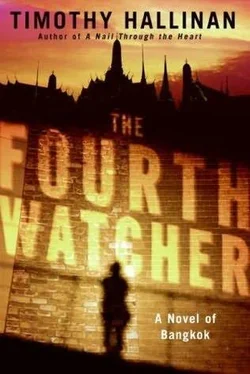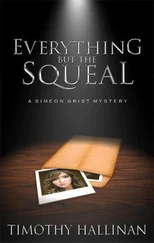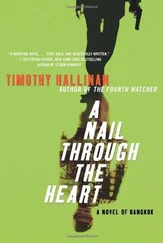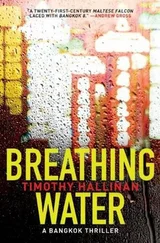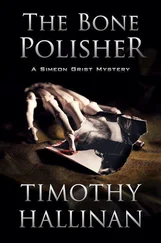Timothy Hallinan - The Fourth Watcher
Здесь есть возможность читать онлайн «Timothy Hallinan - The Fourth Watcher» весь текст электронной книги совершенно бесплатно (целиком полную версию без сокращений). В некоторых случаях можно слушать аудио, скачать через торрент в формате fb2 и присутствует краткое содержание. Жанр: Криминальный детектив, на английском языке. Описание произведения, (предисловие) а так же отзывы посетителей доступны на портале библиотеки ЛибКат.
- Название:The Fourth Watcher
- Автор:
- Жанр:
- Год:неизвестен
- ISBN:нет данных
- Рейтинг книги:4 / 5. Голосов: 1
-
Избранное:Добавить в избранное
- Отзывы:
-
Ваша оценка:
- 80
- 1
- 2
- 3
- 4
- 5
The Fourth Watcher: краткое содержание, описание и аннотация
Предлагаем к чтению аннотацию, описание, краткое содержание или предисловие (зависит от того, что написал сам автор книги «The Fourth Watcher»). Если вы не нашли необходимую информацию о книге — напишите в комментариях, мы постараемся отыскать её.
The Fourth Watcher — читать онлайн бесплатно полную книгу (весь текст) целиком
Ниже представлен текст книги, разбитый по страницам. Система сохранения места последней прочитанной страницы, позволяет с удобством читать онлайн бесплатно книгу «The Fourth Watcher», без необходимости каждый раз заново искать на чём Вы остановились. Поставьте закладку, и сможете в любой момент перейти на страницу, на которой закончили чтение.
Интервал:
Закладка:
She balls her fist to punch him again and thinks better of it. Maybe her hand hurts. “My mama make shop. But I make caffee. Good, na? ”
“Excellent.” Rafferty brings the cup to his lips and watches as someone comes into sight through the window, shrouded in rain. A woman, her clothes pasted to her slender form. She does not keep her head down against the downpour but shields her eyes with a hand, obviously looking for something or someone. He watches idly for a moment, wondering why she hasn’t ducked inside to wait out the storm, and then, with a start, realizes who she is.
He pushes back his stool. “How many baht?” he asks Happy Together.
“Twenty. Caffee no good?”
The girl has passed from sight. So he was right; she had reversed direction, then turned around and followed him again. “It’s excellent,” he says. “But I just saw someone I know.” He gives Happy Together a bright blue fifty-baht note and hurries out into the rain.
The moment he sets foot on the street, a sheet of lightning flattens everything, turning the raindrops ice-white and freezing them in midfall. The boom that follows feels like his own skull crumpling. He starts walking, as fast as he can without breaking into a run, waiting for the girl’s form to solidify through the gray curtain in front of him.
He had meant to tell Prettyman to call off the trackers. He decided over his morning coffee to drop the book idea as too risky for someone with a wife and child, kicking off the first day of his new life with a firm resolve that made him feel briefly adult, despite a twinge of resentment; the book’s topic had interested him. But now things were different. He had responsibilities. He’d write magazine articles. He’d review books-that sounded safe. Maybe he’d do advertising copy.
The prospect had all the allure of a glass of warm milk, but his wife and daughter would be happier. He and Rose would economize; they’d pay Miaow’s tuition, and then worry about everything else. He’d left the apartment with every intention of abandoning the project. Then he had been distracted, thinking about the conversation about Elson, and he’d forgotten to tell Prettyman he was quitting.
Or perhaps, he acknowledges, he likes the excitement. Or maybe he doesn’t want to let go of the advance money.
But now he can clear it up.
He passes a drugstore, a restaurant, a small hotel, a hair salon full of women anxiously lining the window, staring at the rain that will ruin their new hairdos, barely paid for. Cars splash by in the street, throwing up sheets of water three feet high. The light increases by several f-stops, and he realizes the rain is lifting. He can see half a block ahead now.
The girl is nowhere in sight.
He breaks into a run, his feet slapping through the water. Then some giant hand turns off the faucet and the rain stops, as suddenly as it began. The boulevard yawns in front of him, gleaming wet, its sidewalk almost deserted.
She must have turned into a side street. He looks back, certain he didn’t pass one, and sees nothing. Half a block ahead, though, a tuktuk fords a temporary lake across the boulevard and vanishes to the right, obviously heading down a soi. Without breaking stride, Rafferty chases it and enters the soi.
And sees her, walking briskly, almost a block away. She turns, checking behind her, and spots him. At the same moment, she sees the tuktuk and raises a hand to flag it. The tuk-tuk swerves suicidally to the curb, its driver having obviously seen her face, and she climbs in. As it pulls away, she looks back at Rafferty again. Then, with that same quarter smile, she lifts her hand and waves good-bye.
13
A magazine article.
His notebook is pocket-size, awkward for anything but brief reminders, but he scribbles in it anyway, sitting at the outdoor table until the rain drives him inside. “Spytown,” he titles it, ten thousand, maybe fifteen thousand words about the oddly matched collection of spies who, like Prettyman, drifted to Bangkok when the world no longer looked like it was heading for a shooting war. He’d met a few of them. His second conversation with Prettyman had taken place in a bar so discreet it didn’t even have a sign. Rafferty had needed half an hour, trekking up and down the soi on foot, to find it, and when he went inside, it was full of spies.
Well, retired spies, or so they said. Now older and fatter, they looked like traveling salesmen whose territories had shrunk out from under them. There was something unanchored about them, something about the way their eyes checked the room without settling on anything, the way they looked at every face twice, and then twice again, that was unnerving. They seemed always to be reassuring themselves that they had an exit, from the room, from the conversation. Rafferty had heard it said that the only people who were at home everywhere were kings and prostitutes. These men were on the other end of the scale. They weren’t at home anywhere.
All of them were men. They congregated in the booths in groups that assembled and broke up constantly, rehashing operations from twenty years ago, operations on which they’d been on opposing sides. It quickly became apparent that half the men in the bar would have killed the other half on sight in 1985.
Nineteen eighty-five: the year his father had returned to China.
Prettyman had been different in the bar. Rafferty is trying to capture the difference in words when he notices that the rain has stopped again, and he grabs his coffee and his notebook and moves back outside. Arthit will be able to see him better out there, and the air-conditioning on his wet clothing has given him a chill.
A waitress mops the table, but Rafferty, eager to write, sits before she tends to his chair, which has half an inch of water gathered in the low point of the seat. He barely notices, seeing in his mind’s eye the loose, confident way Prettyman moved in the bar, as though he were outdoors and in familiar terrain. Until then Prettyman had always struck Rafferty as someone who navigated the world too carefully, the kind of person who checks frequently to make sure the top is screwed tightly on the salt shaker.
Arnold had been in his element in the bar. As Rafferty was when he was writing the kind of material he enjoyed writing.
“Stop that,” he says out loud. He starts to write again, thinking he might have to reevaluate Arnold. The man in the spies’ bar was more formidable than the vaguely comic ex-spook he thought he knew. Suddenly he realizes he’s been patronizing Arnold.
He stops writing, the point of his pen still touching the page.
“Doing a Raymond Chandler?” someone asks, and Rafferty looks up to see Arthit peering down at the notebook.
“What’s that mean?”
“Chandler wrote on little pieces of paper,” Arthit says, pulling out a chair. “About the size of a paperback book. The trick, he said, was to get a tiny bit of magic on every one of those little pages.”
“Is that so?” Rafferty watches Arthit’s expression as his bottom hits the miniature pond on the seat. After his friend’s eyes have widened
rewardingly, Rafferty says, “The seat’s wet.”
“I know,” Arthit says through his teeth. “It’s very cooling.”
“And how does that piece of information about Raymond Chandler come to be in the possession of a Bangkok policeman?”
“Chandler went to Dulwich, my school in England,” Arthit says. “He was the only famous graduate who interested me, so I read about him. He drank too much. Why do writers drink too much?”
“They’re alone too much.”
Читать дальшеИнтервал:
Закладка:
Похожие книги на «The Fourth Watcher»
Представляем Вашему вниманию похожие книги на «The Fourth Watcher» списком для выбора. Мы отобрали схожую по названию и смыслу литературу в надежде предоставить читателям больше вариантов отыскать новые, интересные, ещё непрочитанные произведения.
Обсуждение, отзывы о книге «The Fourth Watcher» и просто собственные мнения читателей. Оставьте ваши комментарии, напишите, что Вы думаете о произведении, его смысле или главных героях. Укажите что конкретно понравилось, а что нет, и почему Вы так считаете.
